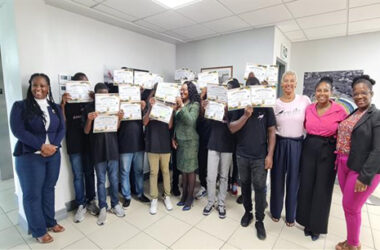
From the moment of his appointment as President of the SLHTA, Sanovnik Destang has expressed a keen interest in improving the relationship between tourism and agriculture from one of coexistence to symbiosis.
In a CARICOM report on St Lucia’s Agricultural sector the organization noted that, “Agriculture continues to be a critical sector for St Lucia although its contribution to GDP has been steadily declining over the last 10 years. The sector contributed approximately 3.1% to GDP in 2014. The country is a net-food importing country, with a growing trade deficit in its food bill over the last 10 years”.
With approximately one-third of all visitor expenditure spent on food, creating linkages between tourism and agriculture holds great potential as a mechanism for sustainable development at the community level. It can therefore not be overstated the critical role that the food and beverage sector plays in the tourism industry’s growth.
A recent Tripadviser barometer study found that more than 60 percent of guests are likely to expand their palate when they come on vacation, proving that placing local products on a menu can be quite beneficial to restaurants and hotels. Referencing Bay Gardens Resorts, the award winning hotel SLHTA President SanovnikDestang manages, he noted that, “when we introduced our farm to table menu it allowed us to see an increase of 10 to 20 percent in revenue.”
It is from this observation and the expressed needs and desires of many local farmers, that the Association plans to focus on strengthening the relationship between the two industries. “I am aware that for many years there has been much talk of the need for linkages as the tourism industry continues to blossom while for agriculture has in many ways stagnated and it is because of this knowledge that I have made this area a priority for my tenure” Destang commented.
Through several initiatives, the Association has already helped many local farmers network and build partnerships with hoteliers. Last year, the SLHTA held an Agricultural Symposium in an effort to dialogue with local producers and suppliers on their current concerns and how the SLHTA could assist in improving the industry. A second symposium was held with hoteliers and restaurateurs to identify prospective opportunities for partnerships with local producers.
Destang explained that through these symposia the hope is to bridge the gap between the two sectors by increasing information sharing among all parties. Finally, an attempt has been made to reduce farmers waiting times for payment for produce sold to hotels. Many hotels have taken the initiative to greatly reduce their time frames for payment to farmers from one to two weeks. Additionally, through the development of the St. Lucia Development Bank’s Express Payment Service financing mechanism, it allows farmers selling to hotels to be paid in 24 hours.
Destang, as part of his key objectives for his tenure as President is committed to building the agriculture sector and is excited to see these plans come into fruition. Coming out of discussions with industry leaders, the SLHTA has identified a multimillion dollar opportunity for the local farming sector. Recently, Destang along with other stakeholders identified a hotel which has been importing $1.3 million a year in nine different crops that can be grown locally. It is now known that with this property there is a demand for 100,000 pounds of pineapples that the hotel would be open to purchasing locally; this alone would amount to $350,000 annually. Following discussions, this hotel would be excited to purchase these crops locally.
“We are excited to pursue this opportunity and many more,” Destang shared. This opportunity alone would be a much needed revenue injection into a much beleaguered industry.
There is much possibility to grow the agricultural industry through linkages with tourism. Investigations have revealed that St Lucia is importing $10 – $15 million crops that can be grown locally and bought at a lower price than when imported. Although many restaurants and hotels have already formed solid partnerships with local suppliers, there remains much work to be done. To assist with building these alliances, the Association recently conducted interviews for an Agricultural Liaison Officer who will intimately work with stakeholders in both industries in an effort to further close the gap between the two sectors.
The Association also hopes that through the work of this Officer, they will be able to develop a small pilot program involving local producers that could result in increased revenues and profitability for small scale farmers by helping them diversify from low value commodities to high-value specialty products which would be sold to hotels and restaurants on island. Through these farmers, the hope is that it will become a guide for what can positively occur when the two industries work together. Destang added that “our hope is to get new and younger farmers to expand their farming and provide them with the financing that they need to hopefully get them started with producing on a larger scale”.
The need to grow the agricultural sector through partnership with the tourism industry falls perfectly in line with the ethos of a sustainable development model for economic growth. Though there are many challenges that will remain, including meeting supply and production demands as well as assisting local farmers in creating a sustainably viable business, this venture is certainly a step in the right direction.







From this small idea other ideas can be added to increase the business level awareness of our government through their agricultural representatives. These representatives should be allowed and travel to world business meetings that would cost the country little, through proper contacts. Here the reps. will learn of changing demands ahead of time to better inform and prepare the local farmers on which crops to grow to meet with the changing times. Farmers are better informed. There is a lesser possibility for over producing as diversity will increase through the meetings with the agricultural reps. However, these reps. must give full accountability in enjoying these entrusted levels of responsibility that is being bestowed unto them. These can be some additional benefits and expansion at little to no cost.
In a world of competition it becomes the responsibility of the government to make their currency strong. That can take various form. Making and promoting our country through program awareness through world business establishments to which we already are a member. Example the U.N. through direct contacts with various world leaders, especially from a possible agriculture/tourist deal. That can increase business, even if the currency stays the same or is lowered. The simple increase in business margin is a big plus with upward potential if handled properly and with the highest level of focus. That focus has to be , increasing the presence of the island on a higher scale, using all media avenues. The internet, free ad promoters sponsored by other groups for promotions, especially dealing with developing countries. We have to get registered so as to be known. Once know, we introduce our selves and most gracefully inform our audience the joy and comfort we offer.even at a discounted price based on numbers to increase the business flow. That business flow allows more foreign capital inflow. With better planning and understand of the needs of these visitors through prior meetings, it makes business easier,through preparing and advertising. That should increase spending. Understand business will fluctuate at times. A better reason to be more global. It establishes further independence. Allowing healthier growth through multiple opportunities.